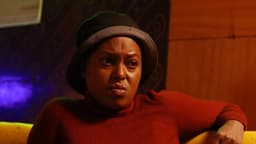
5 eye-openers from Wise Guy: David Chase and the Sopranos
Filmmaker Alex Gibney begins his two-part HBO documentary Wise Guy: David Chase and The Sopranos (both Part One and Part Two are streaming on Showmax) cutting between the series’ opening scenes of a wary, glowering Tony Soprano (James Gandolfini) during his first session with psychiatrist Dr Melfi (Lorraine Bracco), and scenes from the documentary itself, as David Chase, writer-creator of the crime drama series The Sopranos (1999-2007), answers questions while seated in a down-to-the-detail recreation of Dr Melfi’s office.
Alex is in Dr Melfi’s seat, David is in Tony’s. And as Alex splices rapid-fire cuts from their interview, David’s home movie footage, and Sopranos scenes, David Chase and Tony Soprano merge together. How does David feel about that? The moment he realises what’s up, he shifts in his seat, and the Soprano in him comes out as he gripes, “I really regret the amount of f**king verbiage from this morning”.
But he’s not beating this rap, so 25 years after the premier of his groundbreaking series, David Chase reflects – with a begrudging honesty – on how his own history shaped the making of The Sopranos. Get in the car, losers! We’re off down the New Jersey Turnpike to the tune of Woke Up This Morning by Alabama 3.
Stream Wise Guy: David Chase and the Sopranos Part One and Part Two.
Wise Guy David Chase and the Sopranos is not an exhaustive dive into The Sopranos, and it does not have to be. Entire books have been written about the show’s place in the entertainment landscape including The Sopranos Sessions by Matt Zoller Seitz, Alan Sepinwall and Laura Lippman, and The Sopranos: Born Under a Bad Sign by Franco Ricci, and This Things of Ours: Investigating the Sopranos, a collection of essays edited by David Lavery. Instead, Sopranos fans can expect a much more human look behind the scenes, including never-before-seen audition tapes, tales of the negotiations that went into making the series (former CBS head Les Moonves gets what’s coming to him), and even an intimate moment from James Gandolfini’s funeral.
To up the ante, here are five of the most-eye opening things we saw, fresh from witness protection…
1. The magic of auditions

We see montages of the original auditions for The Sopranos, and the performances are good, solid work. Anybody could land a lead role on Law & Order from them. Without the benefit of hindsight, we might wonder why David Chase keeps rejecting them … until a little, long-haired, baby Michael Imperioli reads for Christopher and the character comes to life, shifting from two dimensions, to three. Then James Gandolfini’s sheer force of charisma blows holes in all the other auditions to play Tony Soprano, teasing out Tony’s hair-trigger temper, ironic self-awareness and humour, and his ability to connect with a stranger. Charm and danger instantly draw your attention as he becomes the smartest guy in the room. And don’t miss the queue of mooks and tough guys at the open casting call for The Sopranos Season 2, seen at the start of Part Two.
2. What happens before and after “cut”

For long-time Sopranos fans it feels strangely electric to see the production filming before the start and after the end of some familiar scenes. And then to see everyone re-set and walk around, drop character, fiddle about, get warned to wait for their cue, forget names, or even keep going with something that we never saw on screen because it was cut during editing. For once we get to see the picture extending beyond the boundaries of the frame.
3. Livia Soprano and Norma Chase

Anyone familiar with the lore of The Sopranos knows that Tony’s verbally abusive, guilt-tripping and controlling mother, Livia (played by the late comedian Nancy Marchand) was based on David’s late mother, Norma Chase – the reason he was in the therapy sessions that inspired him to create The Sopranos in the first place. Early in the documentary he describes her saying, “She was terrified and angry at everybody”.
We learn that he thought the only way he could get people to be interested in their dynamic was by replacing himself – a humble TV producer – with (in his words) “a really badass guy.” In Livia, we see one of the most unflattering (posthumous) portraits that a son has ever dedicated to his mother. And David reveals that during the first season, Nancy commented, “I trust that this creature I’m playing is deceased?” But as David describes his mother’s family, dark secrets emerge that shift the picture.
4. Writers’ room stories

By all accounts, working for David gave his writers’ room and cast an up close-and-personal Tony Soprano experience. We find out he was as exacting as a mob boss, keeping a word-for-word grip on the script that permitted no unapproved deviations.
Writer Robin Green, who admits that she was eventually fired for interrupting David too often, describes their first meeting years before the Sopranos: “I see him coming in the door. I think, ‘Oh, f**k.” He just looked so dour … he looked so miserable.” Ten minutes later, though, she reveals that they were both laughing with tears running down their faces as they talked about their mothers. At one point during their chat, she told him, “Here you are, this powerful man, and your mother makes you into a little screaming gerbil or something … This is what you should write about.” It was an odd thing to bond over, but fellow writer Terence Winter chimes in to reveal that “We all had the same mom.” And Frank Renzulli confesses to basing a scene in which Livia complains that her neighbour always has the tap running on his own mom moaning to him about life in her old age home.
5. A star and a disaster

James Gandolfini was just 35 years old when he landed his role in The Sopranos, and everyone in the documentary admits that his brilliant performance and the glare of media attention came at a price. In one of the most thoughtful moments in the documentary, Alex asks David whether he was surprised when he found out that James had died of a heart attack at the age of 51. David says “No.”
That answer comes after the revelation of what James did to psych himself up for Tony’s terrifying violent outbursts, including punching car seats, banging his head against things, walking around with a pointy rock in his shoe, and not sleeping more than three hours a night for two nights running. During the pivotal Season 1, episode 5, which is the first time we see this New Jersey mob boss kills someone on screen, James carried out the on-screen murder with such intensity that he lacerated his hands on Tony’s garotting cable, and shocking on-set pictures show the deep gouges in the sides of his hands.
Nothing sums up the pain and pleasure of their creative partnership like the footage we see of David Chase giving the eulogy at James’s funeral in 2013. In one moment, he begins to cry as he describes seeing James sitting in the blazing summer heat while using a wet handkerchief over his head to cool down – just like the men of David’s family – and feeling suddenly emotional and proud about their shared heritage.
Episode guide
Part One: David Chase talks about growing up in New Jersey, how he got his big break in LA, and what the story was about when he originally pitched The Sopranos to HBO. We also see the casting process and get an inside glimpse at the filming of the first season, along with the buzz around the show as it became a massive, country-wide hit.
Part Two: David breaks down some of the writing challenges on the series to reveal how they balanced drama and comedy while keeping the plot moving, while he and the writers admit to using their personal experiences to inspire certain scenes and characters. The Sopranos teams share their favourite stories about James, and David concludes the documentary in a discussion of the first and final episodes.
Final note: Hats off to David Chase for being willing to share clips from his dire student film, The Rise and Fall of Bug Manousas, along with his barrel-scraping filmmaking days during the 1970s. Grave of the Vampire looks ripe for a late night cult cinema screening thanks to lines like, “I am your son! Your son conceived in a grave!”
Stream Wise Guy: David Chase and the Sopranos Part One and Part Two.
More like this

Billy Joel: And So It Goes (2025)
An honest, insightful, and deeply moving look at the life and career of acclaimed musician Billy Joel, covering both his struggles and triumphs.

Surviving Mormonism with Heather Gay S1
Former RHOSLC cast member Heather Gay investigates hidden truths within the Mormon church, exposing cracks in its perfect facade.

Wizkid: Long Live Lagos (2025)
This intimate and uplifting documentary explores Grammy-winning Nigerian artist Wizkid's rise to superstardom as one of the biggest Afrobeats artists.

Diddy: The Making of a Bad Boy (2025)
This sensational documentary delves into the rise and fall of Diddy, offering insight into his childhood, his meteoric rise, and his arrest.

High Horse: The Black Cowboy S1
Jordan Peele creates this vibrant, eye-opening three-part pop culture and historical documentary. It confronts and reclaims the Wild West while revealing the untold history of the Black cowboy.

You Were My First Boyfriend (2023)
In this introspective high school reunion movie turned inside out, filmmaker Cecilia Aldarondo relives her tortured adolescence.

Love Has Won: The Cult of Mother God S1
This HBO docuseries explores the rise and fall of cult leader Amy Carlson, aka Mother God. As her health declined, followers awaited UFO salvation.

Stand Up & Shout: Songs from a Philly High School (2023)
This heartfelt documentary follows a unique music programme at Hill-Freedman World Academy, which teaches students to create original songs.
Single Kiasi S4, now streaming
Reckless S1, now streaming
More binge-worthy series

Jojo on The Real Housewives Ultimate Girls Trip: Africa reunion, social media backlash and more
Jojo opens up about the highly anticipated reunion for The Real Housewives Ultimate Girls Trip: Africa, coming to Showmax on 20 and 27 February.

Billy Joel: And So It Goes (2025)
An honest, insightful, and deeply moving look at the life and career of acclaimed musician Billy Joel, covering both his struggles and triumphs.

Surviving Mormonism with Heather Gay S1
Former RHOSLC cast member Heather Gay investigates hidden truths within the Mormon church, exposing cracks in its perfect facade.

Heart Eyes (2025)
In this whodunit horror slasher, Valentine's Day is turned into a battle for survival as a masked serial killer goes after couples.
Latest Stories

Fall in love with romantic drama Touch, now on Showmax

Where to watch The Real Housewives franchise online

How to Train Your Dragon: Bringing Hiccup and Astrid to life

7 things to know about indie award-winning movie Dìdi

Mission: Impossible – The Final Reckoning’s South African stunts
%2520(1)-1.jpg&w=2560&q=80)
Lenana Kariba speaks on returning for Single Kiasi Season 4
Veteran actor Helen Keli spills on playing Delilah on Single Kiasi S4

The Real Housewives Ultimate Girls Trip cast on first impressions, beefs and more

Novocaine: the US box office hit shot in Cape Town

Evodia on Ultimate Girls Trip Africa and her return to reality TV

From Poverty to Purpose: The Redemption of Emmanuel Adebayor: Why Saving Lives Trumps Scoring Goals

Christall on The Ultimate Girls Trip, Evodia and more

Manchester City vs Liverpool: The Rivalry Reignites

New seasons of your favourite series, now streaming

The best romantic series on Showmax

What to watch on Showmax in Kenya in November 2025

17 medical dramas to stream in an entertainment emergency

Annie Mthembu opens up about The Real Housewives Ultimate Girls Trip Africa

Can LFC rediscover the form that saw them crowned champions?

Conor Bradley on Liverpool's difficult run and the path back
Big mobs, small jobs: 10 crime series to stream on Showmax

Must-watch trailer: The Real Housewives Ultimate Girls Trip: Africa

Showmax Premier League weekly watchlist: 18-23 February

Creating The Lord of the Rings: The War of the Rohirrim







